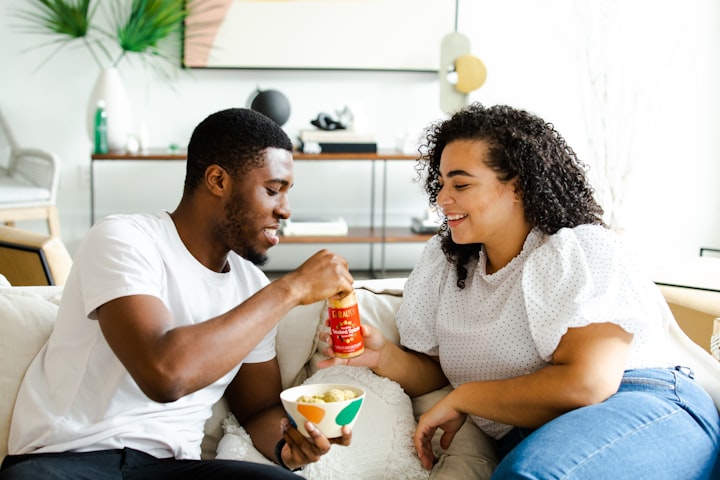I'll Raise You a Steak Tartar for Your Butternut Bake
We've all heard that opposites attract. But what happens when you're a vegan and she needs bacon for breakfast. What's for dinner?

More and more people are going meatless, and it's not just a fleeting trend. However, different people make dietary changes in different ways and at a different pace. Some choose to gradually reduce certain foods while others prefer to make a 180 degree shift in their diet all at once. Some find a comfortable place in the middle, while others find it impossible to compromise.
And it's not just about changing your habits (as if that isn't challenging enough!), it can often take a toll on one's relationship as well. There are so many potential stumbling blocks in relationships, especially with the stress factor of the fast pace we're living these days. As more and more people focus on healthy lifestyles and shifting dietary options, even the most devoted couple could be confronted with culinary war! If you find yourself in this situation, what do you do? Before we get to the answers, let's start with understanding the motives.
What are the main motivations behind people eating less meat?

Eating less meat is healthier – Research has proven the Mediterranean diet to be one of the world's healthiest. It's great for the heart, managing diabetes, and has many other health benefits. It consists of mainly plant-based foods with fish, legumes, and healthy fats like olive oil and nuts. Red meat is only eaten a few times a month.

People who eat less meat have more energy – Have you ever eaten a meat-based meal and felt like a nap after? The body works harder to digest meat than plant-based foods. When I stopped eating meat, I began to feel a lot more energetic!
Eating less meat could help you avoid disease – Red meat has been linked to heart disease, diabetes, and even some cancers. Where meat can increase health risks, plant-based foods like beans and soy can actually reduce it!
It is ethical to eat less meat (or none at all!) – The reality of eating meat is that most of it is not ethically sourced and comes from factory farms. The fewer people eat meat, the fewer factory farms there'll be. At the very least, everyone should eat sustainably sourced meat. The tons and tons of grain that feeds livestock can be used to save the lives of starving people worldwide.

Vegetarian Victor vs. carnivorous Kate
When one partner decides to switch to a plant-based diet, and the other one is still hooked on steaks and sausages, the practical, ideological, and emotional challenges could cause chaos. But, just like other relationship trials, it's not impossible to overcome, and I've experienced this. I call myself a flexitarian, but my diet is mostly plant-based. A couple of years ago, I had a partner who loved meat, and things got a bit tricky.
Here are some of the challenges I have faced (and I'm quite certain I'm not the only one) and ideas on how to tackle them:
Finding a restaurant that suits both – As plant-based diets are becoming more and more mainstream, more restaurants are adding vegan options to their menus. But, if you can't find anything that suits both, there is nothing wrong with taking the time to eat whatever you want without considering your partner's dietary requirements. You could go out with friends or family members who share your dietary choices or take yourself out to a place that would not accommodate your partner's food needs.
Going to family functions - When you and your partner go to functions, holidays, or outings with friends and family, communicate your needs. Let the people who are preparing the food or making the bookings know about your eating habits. Explain that they shouldn't feel offended if they can't make particular concessions and the food is rejected. Understanding differences can help people to be more accepting.
Clean up time – Even if the carnivore makes themselves a meaty meal and the vegan puts their plant-based meal together, cleaning up presents a new set of challenges, especially for the vegan. The easiest way to do this is for each person to rinse off their dishes, so the vegan doesn't have to deal with things like animal fat or bones.
Organizing storage – If you don't eat meat, dealing with it in your fridge and freezer can be really horrible, especially when the packaging leaks a bit of blood. Some couples get a separate mini fridge/ freezer just for meat. Others invest in solid-color containers to store the meat in.
Food should be something that you enjoy while you make happy memories. For couples to get along when their diets are not aligned is not rocket science. All it takes is communication and some logic to work out the logistics of eating together. Throw in mutual respect and love for self, each other, and of course the planet, and you're sorted!
Don't Let Food Ruin Your Relationship
The bottom line is, in an ideal world, we'd all stop eating meat. But, since this is not realistic, even if one of you eats meat and the other one doesn't, it would be a pity to ruin the relationship over dietary choices. You did not fall in love with what they put on their plate, you fell in love with them.
About the Creator
Gilles Berdugo
The name is Gilles, I'm just a friendly freak of nature, environmentalism, and travel. Always on the lookout for cool sustainable solutions and opportunities to help others go green. Reuse, reduce, recycle 😉.







Comments
There are no comments for this story
Be the first to respond and start the conversation.